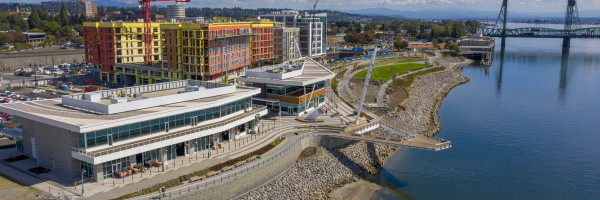Placemaking Vancouver Canada Case Studies
| Placemaking Vancouver Canada Case Studies | |
|---|---|

| |
 Placemaking Vancouver WA | |
| Team Organizations | RWTH Aachen University Simon Fraser University |
| Team Leaders | Robin Chang |
| Participating Municipalities | Vancouver WA |
| Status | Implemented |
| Initiative | Placemaking |
| Document | 
|
Description
The Vancouver Peacemaking Project reimagines industrial lands as inclusive and dynamic Third Places, fostering connections among workers, businesses, and the broader community. Through a "research through urban design" approach, the project highlights the often-overlooked routines of industrial workers and explores design interventions that support their well-being and sociability. A key focus is the Commissary Connect food business incubator, which leverages shared resources and networking to create a thriving food ecosystem. By repurposing underutilized spaces at Commissary Gourmet, the project envisions a coworking and event hub that nurtures collaboration, food security, and economic growth, all while acknowledging and integrating the cultural and historical significance of the land.
Challenges
The project faced several challenges, including the ongoing displacement of industrial lands due to development pressures, which threatened the livelihoods of workers and businesses. A major obstacle was the lack of attention to the social and spatial needs of industrial workers, whose routines and well-being are often overlooked in urban planning. Additionally, adapting the concept of Third Places to industrial settings required a critical re-interpretation of sociability and inclusion in traditionally work-focused environments. The underutilization of spaces at Commissary Gourmet posed both a challenge and an opportunity, requiring innovative design solutions to transform them into functional coworking and networking hubs. Finally, integrating the historical and cultural significance of the land while fostering economic growth and food security demanded a delicate balance between honoring Indigenous heritage and promoting sustainable urban development.
Solutions
The project addressed these challenges by reinterpreting industrial spaces as inclusive Third Places, fostering social connections and worker well-being through thoughtful urban design interventions. It leveraged Commissary Connect as a food business incubator to create a collaborative ecosystem, utilizing shared resources and networking to support economic growth. The underutilized upper level of Commissary Gourmet was transformed into a coworking and event hub, providing space for collaboration, learning, and community engagement. To integrate cultural and historical significance, the project acknowledged Indigenous heritage and sought opportunities to incorporate it into design and programming. By bridging industrial workspaces with community-driven placemaking, the project fostered a sustainable, inclusive, and resilient urban environment.
Major Requirements
The program required a multidisciplinary approach that combined urban design, community engagement, and economic development to reimagine industrial spaces as inclusive Third Places. It needed a framework for integrating worker well-being, social connectivity, and sustainable business growth within industrial settings. Additionally, it required physical space optimization, particularly at Commissary Gourmet, to transform underutilized areas into coworking and networking hubs. Collaboration with local businesses, policymakers, and Indigenous communities was essential to ensure cultural sensitivity, economic viability, and long-term sustainability. Finally, the program needed technological support for networking, marketing, and resource-sharing among food entrepreneurs, reinforcing its role as a catalyst for community-driven placemaking and economic resilience.
Performance Targets
| Key Performance Indicators (KPIs) | Measurement Methods |
|---|---|
|
|
Standards, Replicability, Scalability, and Sustainability
The project must comply with local zoning and building codes in Vancouver, Washington, ensuring that industrial and commercial spaces are used appropriately and meet safety and accessibility requirements. The Washington State Building Code and Americans with Disabilities Act (ADA) standards must be followed to create an inclusive and safe environment. Sustainability considerations should align with Washington’s Clean Energy Transformation Act (CETA) and local environmental policies to promote green building practices. Food industry regulations, including Washington State Department of Health guidelines and FDA Food Code requirements, apply to Commissary Connect’s kitchen operations. Additionally, the project must respect the historical and cultural significance of the land by acknowledging the Indigenous communities that have long inhabited the region and integrating their perspectives into placemaking efforts.
Cybersecurity and Privacy
The project must ensure the security of digital platforms used for networking, resource-sharing, and business transactions by complying with Washington State privacy laws, such as the My Health My Data Act, and broader U.S. cybersecurity frameworks like the NIST Cybersecurity Framework. If handling financial transactions, the project must adhere to PCI DSS (Payment Card Industry Data Security Standard) to protect payment data. Strong encryption, multi-factor authentication, and network security measures should be implemented to safeguard user information. Additionally, regular security audits and cybersecurity awareness training can help users recognize and prevent phishing attacks, data breaches, and malware threats. Since AI-enhanced tools are part of the project, ethical AI usage guidelines should be followed to protect proprietary business data and prevent misuse of digital assets.
Impacts
The project has significant economic, social, and cultural impacts on Vancouver, Washington’s industrial and food business communities. Economically, it fosters entrepreneurship and business growth by providing shared resources, networking opportunities, and infrastructure to support small food businesses. Socially, it enhances worker well-being by transforming industrial spaces into inclusive Third Places, promoting collaboration, connectivity, and a sense of belonging among workers and community members. Culturally, the project acknowledges and integrates the historical significance of Indigenous lands, creating opportunities for cultural recognition and engagement. Additionally, by addressing food security and sustainability through partnerships with local organizations, the project contributes to a more resilient and community-driven urban environment.
Demonstration/Deployment
These impacts are demonstrated through measurable engagement, economic growth, and community partnerships. Increased participation in networking events, coworking spaces, and collaborative initiatives at Commissary Connect reflects stronger worker engagement and social connectivity. Business growth is evident in the number of food entrepreneurs benefiting from shared resources, mentorship, and expanded market reach. The project’s cultural impact is demonstrated through the inclusion of Indigenous history in placemaking designs and partnerships with local Indigenous organizations. Food security initiatives and collaborations with external organizations showcase the project’s broader community impact. Lastly, sustainability efforts, such as optimizing underutilized spaces and supporting eco-friendly food production, reinforce the project’s long-term contribution to economic and environmental resilience.